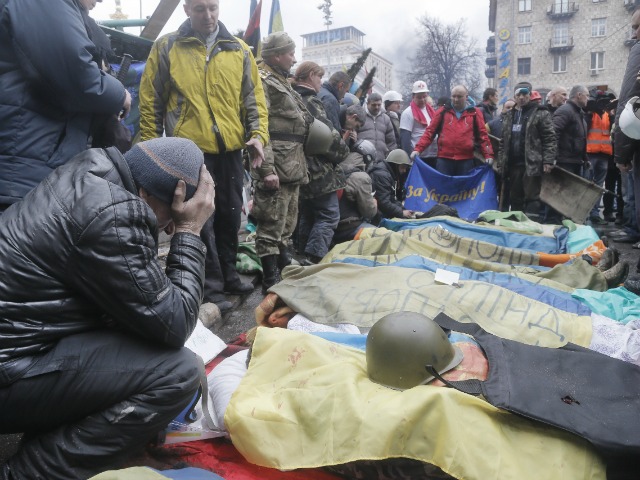
The sun rose on Thursday to what may be the bloodiest day in Ukraine since negotiations with Russia triggered mass protests in the capital of Kiev. Hours after President Viktor Yanukovych announced a truce with opposition leaders, CNN reported that “at least 100” are dead after a skirmish led to the end of the truce.
While the end of the truce has both been widely reported and announced by the Ukrainian government, the origins of the violence that ended it are still unclear. CNN reports that protesters resumed the violence by throwing rocks and Molotov cocktails at state police forces that were, as per the truce, retreating. Other reports, notably from the AFP, suggest that “professional sniper fire” was also in play after the truce had begun, suggesting that government officials played a role in rekindling the violence but not confirming any motives or guilt.
Yanukovych blamed the new violence entirely on the opposition. The president claimed in a statement that “the opposition used the negotiation to buy time” but protesters on the street broke it, so the government would be responding in kind. So far, CNN is estimating 100 dead and 500 injured, making Thursday the deadliest day of protests yet. The Kyiv Post‘s numbers are significantly less dramatic, however– they are reporting 28 dead since this morning.
The Kyiv Post also notes the arrival of EU officials to Kiev to negotiate with the government and discuss the possibility of sanctions to stop the violence. The Foreign Ministers of Germany, France, and Poland are in town and set for talks with Yanukovych this morning. French Foreign Minister Laurent Fabius told the press that the violence was “unacceptable” and that he believed sanctions were necessary against those committing the violence. The three officials are expected to leave Kiev to go to Brussels and discuss the sanctions with the rest of the member countries.
Ukraine’s relationship with the European Union was the initial catalyst for all the turmoil of the past several months. Yanukovych had spent months negotiating with EU officials on a trade deal that would have opened up his country to the EU and made private business with the West much easier for the nation. Russian President Vladimir Putin intervened, threatening not to sell Ukraine petroleum at a critical time before the harsh Ukrainian winter. Yanukovych yielded, rescinded his deal with the EU, and moved closer to Putin.
Ukrainians, fearing getting too close to the former mother country, began protesting against too friendly a relationship with Russia. Leaders of other post-Soviet states visited the protesters, including the current Moldovan premier and former Georgian President Mikheil Saakashvili.
The government announced the truce on their website last night, after the president sat down with opposition leaders Arseniy Yatsenyuk, Vitali Klitschko, and Oleg Tyagnibok. The group settled on a truce that should have begun negotiations to further stabilize the country by giving the opposition more power in government and negotiating the nation’s relationship with Russia. The collective authority of the leaders–all party leaders in the legislature before violence rendered the daily routine of governing impossible–was insufficient to keep either side of the negotiations at bay.

COMMENTS
Please let us know if you're having issues with commenting.